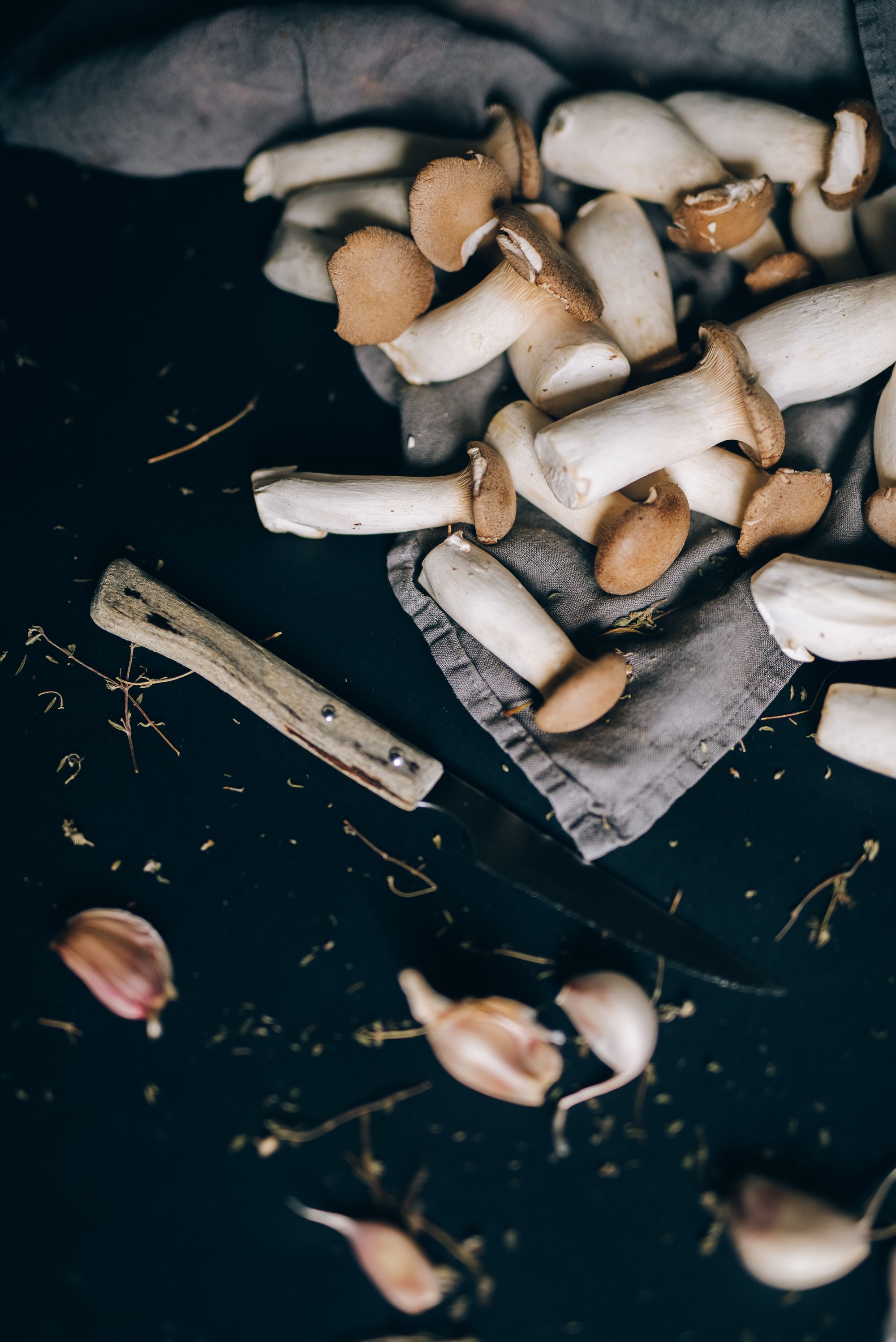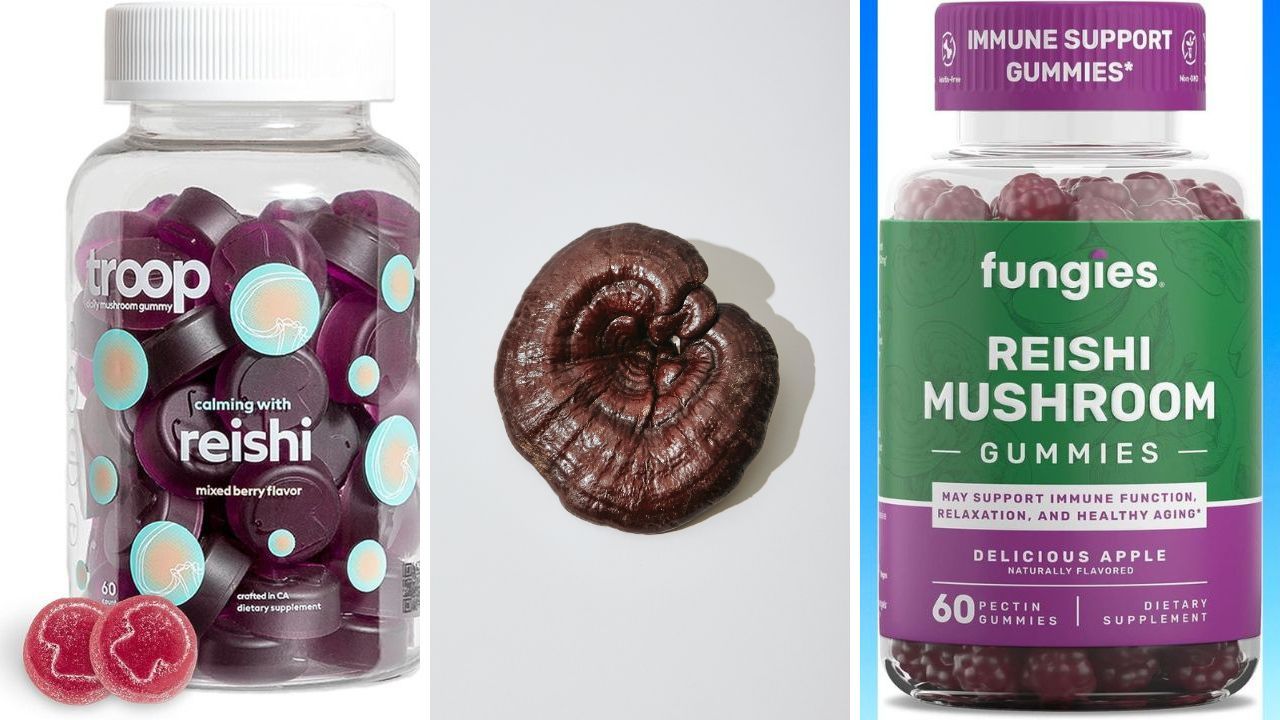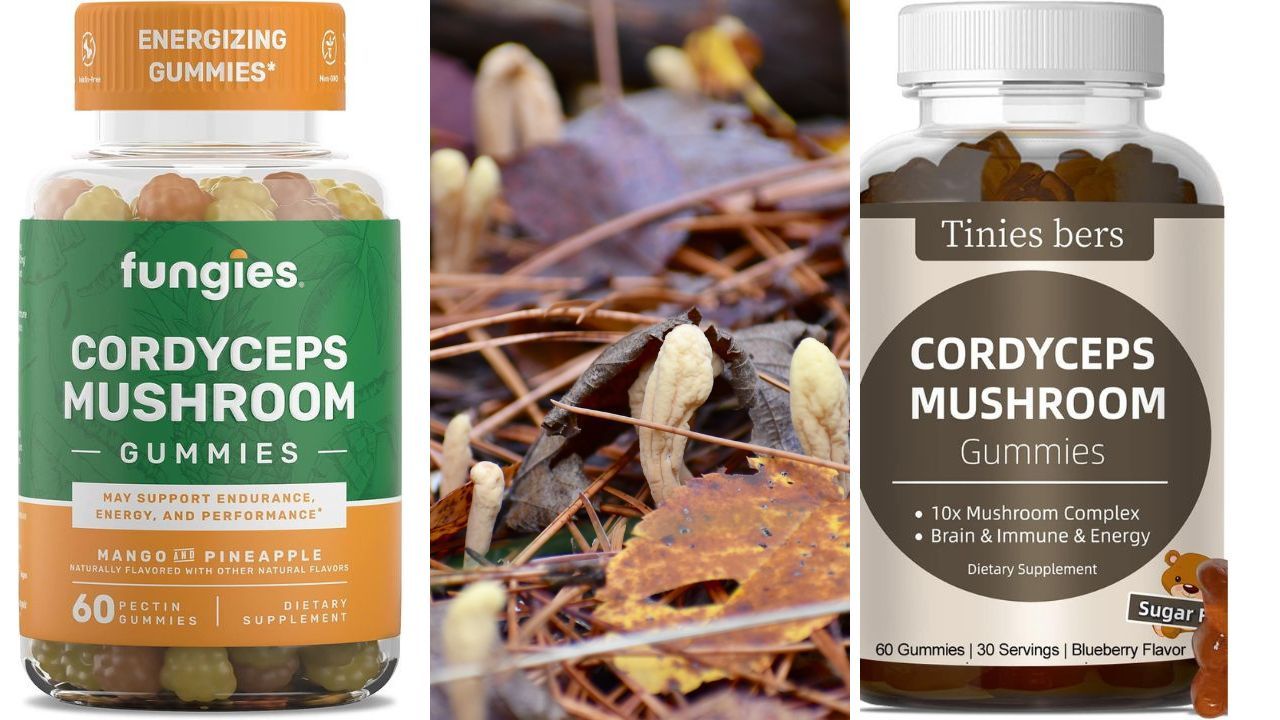Mushrooms have long been revered in traditional medicine and wellness practices for their remarkable medicinal properties. These fungi offer a treasure trove of unique compounds that can support our health and well-being.
In this comprehensive guide, we will delve into the captivating world of medicinal mushrooms, focusing on six exceptional species: Cordyceps, Reishi, Lion's Mane, Shitake, Turkey Tail, and King's Trumpet Mushroom.
Discover their benefits, usage, and nutritional value, and learn how to incorporate these powerhouses into your daily routine.

Best Medicinal Mushrooms: Traditional Chinese Medicine
Cordyceps:
Cordyceps is a unique and fascinating medicinal mushroom known for its parasitic growth on caterpillar larvae in the wild.
This mushroom has gained popularity for its potential health benefits, including increased energy levels, improved athletic performance, and enhanced respiratory function.
Cordyceps is rich in antioxidants and contains essential minerals like zinc, magnesium, and selenium.
Cordyceps is a remarkable medicinal mushroom renowned for its intriguing life cycle and numerous potential health benefits.
Found primarily in the mountainous regions of Asia, this unique fungus is known for its parasitic nature, as it infects the larvae of insects, eventually sprouting long stalks from their bodies.
In traditional Chinese medicine, Cordyceps has been prized for centuries due to its believed capacity to enhance energy levels, improve endurance, and support respiratory function. It is also touted for its antioxidant properties.
Rich in essential minerals such as zinc, magnesium, and selenium, Cordyceps is considered an adaptogen, helping the body adapt to stress and maintain balance.
As a result, Cordyceps has gained popularity as a natural supplement for athletes and individuals seeking a natural energy boost and overall vitality.

Reishi Mushroom
Reishi, also known as the "Mushroom of Immortality," is a prominent mushroom in traditional Chinese medicine. It is recognized for its potential to support the immune system, reduce stress, and promote overall well-being.
Reishi mushrooms are a good source of polysaccharides, triterpenes, and other bioactive compounds.
Characterized by its distinct red or brown woody appearance, Reishi is renowned for its potential health benefits. It has been historically cherished for its immune-boosting properties, stress-reduction capabilities, and overall wellness promotion.
This remarkable mushroom contains a variety of bioactive compounds, including polysaccharides and triterpenes, which are believed to contribute to its therapeutic effects.
Regular consumption of Reishi is thought to fortify the immune system, enhance resilience to stress, and potentially alleviate various health concerns.
While its flavor is quite bitter, Reishi is typically consumed in the form of extracts, teas, or supplements to harness its impressive array of health-promoting properties.

Lion's Mane Mushroom
Lion's Mane is an edible mushroom with a furry, cascading look reminiscent of a lion's mane. It has been used in traditional Chinese medicine for centuries and is now gaining attention for its potential brain-boosting benefits.
Lion's Mane contains compounds called erinacines and hericenones, believed to stimulate nerve growth factor (NGF) production.
Lion's Mane mushroom, scientifically known as Hericium erinaceus, is a unique and visually striking fungus with long, cascading white spines that resemble a lion's mane.
Beyond its captivating appearance, Lion's Mane has gained significant recognition for its potential cognitive benefits. This mushroom is thought to stimulate the production of nerve growth factor (NGF), a protein vital for the growth, maintenance, and repair of nerve cells.
Consequently, Lion's Mane is often associated with improved cognitive function, enhanced memory, and potential support for neurological health. It has also been explored for its potential role in reducing inflammation and anxiety.
Lion's Mane is commonly consumed as a supplement or in culinary dishes, making it a fascinating and promising addition to the world of medicinal mushrooms with its focus on neurological well-being.

Shiitake Mushroom
Shiitake mushrooms are a well-known culinary delight and a valuable medicinal mushroom. They are rich in essential nutrients like B vitamins, copper, and selenium.
Shiitake mushrooms may support heart health, boost the immune system, and have potential anti-inflammatory properties.
Shiitake mushrooms, scientifically known as Lentinula edodes, are one of the most popular and widely recognized culinary mushrooms worldwide.
These flavorful fungi have a rich, earthy taste and are celebrated not only for their deliciousness but also for their potential health benefits.
Shiitakes are a good source of B vitamins, particularly vitamin B6 and pantothenic acid, as well as essential minerals like copper, selenium, and zinc.
Beyond their nutritional value, Shiitake mushrooms have been studied for their potential to support heart health by lowering cholesterol levels and improving circulation.
They are also believed to possess immune-boosting and anti-inflammatory properties.
Often incorporated into a variety of dishes, from stir-fries to soups, Shiitake mushrooms seamlessly combine culinary enjoyment with potential health advantages, making them a staple in both traditional Asian cuisine and contemporary dietary practices

Turkey Tail Mushroom
Turkey Tail mushrooms are named for their colorful, concentric rings that resemble a turkey's tail feathers.
They are renowned for their immune-boosting properties, primarily attributed to their high content of beta-glucans. Research suggests that Turkey Tail mushrooms may play a role in supporting the body's defenses against infections and illnesses.
The Turkey Tail mushroom, scientifically known as Trametes versicolor, is a striking and multicolored bracket fungus named for its resemblance to the tail feathers of a turkey.
Beyond its aesthetic appeal, this mushroom has garnered attention for its potential health benefits. Turkey Tail is particularly valued for its rich content of beta-glucans, which are polysaccharides known for their immune-boosting properties.
Research suggests that regular consumption of Turkey Tail may enhance the body's immune response, making it a popular choice among those seeking to fortify their defenses against infections and illnesses.
Additionally, this mushroom has been investigated for its potential in cancer therapy as an adjunct treatment due to its immune-modulating effects.
Often consumed as a tea or in supplement form, Turkey Tail exemplifies the fusion of traditional herbalism and modern scientific research in the realm of medicinal mushrooms.

King's Trumpet Mushroom (Pleurotus eryngii):
The King's Trumpet Mushroom, also known as the King Oyster Mushroom, boasts a hearty and meaty texture, making it a popular choice for culinary use.
In addition to its delicious flavor, this mushroom provides a good source of protein, B vitamins, and minerals like potassium and phosphorus.
While it may not have as extensive medicinal properties as some other mushrooms, it contributes to a balanced diet and can potentially support immune function due to its nutrient profile.
The King's Trumpet mushroom, scientifically known as Pleurotus eryngii, is a gourmet culinary delight celebrated for its robust flavor and meaty texture.
Unlike some other medicinal mushrooms, King's Trumpet may not possess an extensive array of therapeutic properties, but it compensates with its exceptional taste and nutritional value.
These mushrooms are a valuable source of protein, B vitamins, such as niacin and riboflavin, and essential minerals like potassium and phosphorus.
While they may not be primarily sought after for medicinal purposes, King's Trumpet mushrooms still contribute to overall health and well-being by providing essential nutrients.
They are a popular choice for various culinary creations, offering a savory umami flavor that complements a wide range of dishes, making them a cherished ingredient in gourmet cuisine around the world.

Maitake Mushroom
Maitake mushrooms, scientifically known as Grifola frondosa, are a highly esteemed and delicious species of edible fungi with a rich history in both culinary and traditional medicinal practices.
These mushrooms are recognized for their distinctive, fan-shaped clusters of overlapping caps, which can grow quite large in the wild. Maitakes are often referred to as "hen of the woods" due to their resemblance to the fluffed feathers of a nesting hen.
Renowned for their earthy and umami flavor, they have found a prominent place in various cuisines, especially in Asian and Japanese cooking.
Beyond their culinary appeal, Maitake mushrooms are also associated with several potential health benefits, such as immune system support and blood sugar regulation, making them a sought-after ingredient in both gourmet dishes and natural medicine.
Whether enjoyed in a savory stir-fry or brewed into a health-boosting tea, Maitake mushrooms continue to captivate food enthusiasts and health-conscious individuals alike.

Chaga Mushrooms
Chaga mushrooms, scientifically known as Inonotus obliquus, are a remarkable and intriguing species of fungi that thrive in the cold, northern forests of North America, Europe, and Asia.
Recognized by their distinctive appearance, Chaga mushrooms grow as a dark, charcoal-like mass on the bark of birch trees, resembling a chunk of burnt wood.
Despite their unconventional appearance, Chaga mushrooms have a long history of use in traditional medicine, particularly in Siberian and Native American cultures, where they were regarded as a potent remedy for various ailments.
These mushrooms are rich in antioxidants and contain compounds like betulinic acid, which are believed to offer numerous health benefits, including immune system support and anti-inflammatory properties.
In recent years, Chaga mushrooms have gained popularity as a superfood and health supplement, often consumed in the form of teas, tinctures, or extracts.
Their unique flavor, which is reminiscent of earthy and slightly bitter tea, has also made them an intriguing addition to the world of herbal infusions and holistic wellness practices.

Some Final Thoughts
Each of these medicinal mushrooms offers unique benefits and nutritional value, contributing to overall health and well-being when incorporated into a balanced diet or used as a dietary supplements.
It's important to note that individual responses to these mushrooms can vary, and consulting with a healthcare professional is advisable, especially if you have specific health concerns or conditions.
Medicinal mushrooms possess an array of remarkable benefits and are a valuable addition to any wellness routine.
Incorporating Cordyceps for endurance, Reishi for immune support, Lion's Mane for cognitive function, Shitake for heart health, Turkey Tail for immune strength, and King's Trumpet Mushroom for cardiovascular support can provide a holistic approach to well-being.
Whether consumed as supplements, teas, or added to culinary creations, these powerful fungi have the potential to optimize our health and unlock nature's healing power.
Note: It is advisable to consult with a healthcare professional before incorporating medicinal mushrooms into your routine, especially if you have underlying health conditions or are taking medications that may interact with these supplements.

FAQ's
Are medicinal mushrooms safe to consume?
Yes, medicinal mushrooms are generally safe for consumption. However, it is important to purchase them from reputable sources and follow proper dosage guidelines.
Can I take medicinal mushrooms if I have allergies?
If you have known allergies to mushrooms, it is advisable to avoid consuming medicinal mushrooms or consult with a healthcare professional before doing so.
Can children and pregnant women consume medicinal mushrooms?
It is recommended that children, pregnant women, and individuals with specific health conditions consult with a healthcare professional before incorporating medicinal mushrooms into their diet.
How should I consume medicinal mushrooms?
Medicinal mushrooms can be consumed in various forms, including capsules, powders, and teas, and incorporated into recipes such as soups, stir-fries, and smoothies.
Can I take multiple types of medicinal mushrooms together?
Yes, it is safe to combine different types of medicinal mushrooms. Many supplements and blends on the market already contain a combination of these mushrooms for synergistic benefits.
How long does it take to experience the benefits of medicinal mushrooms?
The time it takes to see the effects of medicinal mushrooms can vary depending on factors such as individual physiology and the specific health condition being addressed. It is recommended to give it a few weeks to notice any significant changes.
Are there any side effects associated with medicinal mushrooms?
Generally, medicinal mushrooms are well-tolerated. However, in some cases, mild side effects like digestive discomfort or allergic reactions may occur. If you experience any adverse effects, discontinue use and consult a healthcare professional.
Can I take medicinal mushrooms alongside my medications?
It is important to consult with a healthcare professional before taking medicinal mushrooms alongside medications as they may interact with certain drugs.
Are there any contraindications for medicinal mushrooms?
Medicinal mushrooms may not be suitable for individuals with autoimmune conditions, bleeding disorders, or who have recently undergone organ transplants. It is best to consult with a healthcare professional if you have any pre-existing health conditions.
Q: Can I grow my medicinal mushrooms at home?
Yes, some varieties of medicinal mushrooms can be grown at home with the right environment and proper techniques. However, it requires knowledge and expertise, so researching or consulting mushroom cultivation experts is recommended.
Conclusion
For centuries, medicinal mushroom supplements have been used to treat a variety of ailments, and today they can still be found in natural supplements and teas.
Although there are many types of medicinal mushrooms, some of the best include reishi, maitake, cordyceps, and chaga.
A Reishi mushroom, for example, is often called the "king of mushrooms" due to its impressive health benefits.
A Maitake mushroom is known for its immune-boosting properties, while a cordyceps mushroom is believed to enhance athletic performance.
Chaga mushrooms are another popular choice, often used to help with digestion and inflammation.
So whether it be a Chaga mushroom, Maitake mushrooms, or even a Shiitake mushroom, get yourself one of these fabulous fungi for better health!
















Member discussion